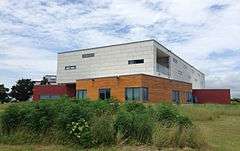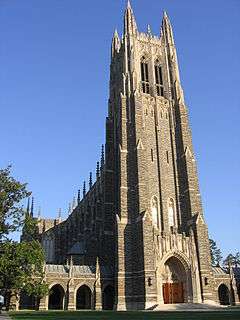Duke University Marine Laboratory
The Duke University Marine Laboratory (commonly referred to as the "Duke Marine Lab") is a research facility and campus of Duke University on Piver's Island,[1] near Beaufort and the Outer Banks, North Carolina specializing in studying marine biology. It is part of the Nicholas School of the Environment's Division of Marine Science and Conservation.[2]
| Duke University Marine Laboratory | |
|---|---|
 Pilkey laboratory at the Duke Marine Lab | |
| Alternative names | Duke Marine Lab |
| General information | |
| Town or city | Piver's Island (Private) |
| Country | United States of America |
| Opened | 1938 |
| Owner | Duke University |
The current official goal of the Marine Laboratory is to study marine environmental systems and conservation utilizing the resources of the facility's proximity to the ocean.[3] It is a member of the National Association of Marine Laboratories[2] and the Marine Sciences Education Consortium.[4]
History
The main campus of Duke University is not in close proximity to the ocean, but with the Marine Laboratory campus, the University is able to conduct hands-on oceanographic studies.
The site for the laboratory was selected in the early 1930s, with the first building completed by 1938.[5] The original intention of the facility was to be a summer training facility and research facility for the university.[6]
By 1963, the facility had reached national recognition for its resources. At the time 75% of students and 40% of researchers came from other universities than Duke.[7]
Sylvia Earle, a renowned oceanographer[8] and pioneer of Jacques Cousteau's AquaLung Scuba device, received her M.S. and Ph.D. from Duke in 1956 and 1966, and has a connection to the Marine Laboratory.[9]
In 1990, the laboratory assumed much of the research of Fairleigh Dickinson University's West Indies Laboratory for Underwater Research in St. Croix, Virgin Islands after Hurricane Hugo damaged the St. Croix facility.[10][11]
Cindy Lee Van Dover was named the first female-director of the center in 2007. She has initially worked at the laboratory in the 1970s.[12]
On June 5, 2017, the Marine Laboratory participated in a green-illumination protest with other buildings at Duke in support of the Paris Climate Accords along with similar actions at Harvard, Stanford, Yale, Columbia, and MIT.[13]
Facilities and Ships
Since its inception in 1938, the campus has expanded significantly to include wet and dry laboratories[14] as well as a fleet of research ships.
Land-based Facilities
Research Facilities
- "Lab 1," in continuous operation since 1938, contains running sea-water tables[15]
- Marguerite Kent Repass Ocean Conservation Center "Green Marine Lab"[16]
- Marine Conservation Molecular Facility (MCMF)[17]
- Orrin Pilkey Laboratory[18]
- Bookhout Research Laboratory[18]
- Pearse Memorial Library and associated computer equipment[19]
Support Facilities
Ocean Vessels (Former and Current)
- The Eastward[22]
- Cape Hatteras[22]
- R/V Richard Barber[23]
- R/V Kirby-Smith[23]
- Various Skiffs[24]
- Unnamed Future Vessel (2018). This ship will be funded by an $11 million gift from Duke University Trustee and alumnus Jeff Ubben and built in partnership with the National Oceanic and Atmospheric Administration (NOAA). It increases the scope of the research possible at the facility by expanding the duration and capacity of sea voyages.[25][26]
Partnerships
Duke University shares Piver's Island with the National Oceanic and Atmospheric Administration (NOAA), whichhas a 60,000 square foot marine laboratory.[27] The current director of the National Laboratory is also an alum of Duke University.[28] Duke has partnerships with other universities for marine research, such as Wittenberg University,[29] Franklin and Marshall College,[30] and Marquette University,[4] for use of the Marine Laboratory for students.
Research and Media Coverage
The research originating from the laboratory has often been published in scientific journals, such as Policy Studies Journal,[31] Ecology Letters,[32] Marine Turtle,[33] and Conservation Biology.[34]
Recently, the laboratory's research about the effect of plastic on sea coral has gained national media coverage.[35] Other notable research includes the interaction of light pollution and marine life[36] and studies of whale migration patterns.[37]
In 2017, the Marine Laboratory was featured in television series Xploration Station[38] with Philippe Cousteau Jr., the grandson of oceanographer Jacques Cousteau.
See also
- Stanford University's Hopkins Marine Station
- University of Hawaii's Institute of Marine Biology (HIMB)
- University of New England's Marine Biology Program
- University of New Hampshire's Marine Biology Program
- University of Tampa's Marine Biology Program
References
- Norman, Christensen (Fall 2015). "Nicholas School of the Environment at Duke University" (PDF). DukEnvironment.
- "Mission Statement & History | Nicholas School". nicholas.duke.edu. Retrieved 2018-07-28.
- "Description of Duke Marine Lab (@DukeMarineLab) | Twitter". twitter.com. Retrieved 2018-07-28.
- "Duke University > Biological Sciences > Marquette University". www.marquette.edu. Retrieved 2018-07-28.
- "From the Archives: Marine Lab 'Then and Now'". Retrieved 2018-07-28.
- "Guide to the Nicholas School of the Environment Records, 1916-ongoing". David M. Rubenstein Rare Book & Manuscript Library. Retrieved 2018-07-28.
- Bookhout, C.G. (1963). "DUKE UNIVERSITY MARINE LABORATORY" (PDF). Marine Laboratories: 270–272 – via OUP.
- "The Last Dive?". Newsweek. 2013-01-14. Retrieved 2018-07-28.
- "Sylvia Earle, "Face of Marine Biology," Receives Distinguished Alumni Award | Duke Graduate School". gradschool.duke.edu. Retrieved 2018-07-28.
- "EDUCATION; Year of Classes Canceled at Marine Lab". Retrieved 2018-07-28.
- "EDUCATION; Fairleigh Dickinson Closing Laboratory On Virgin Islands". Retrieved 2018-07-28.
- Dreifus, Claudia. "Deep in the Sea, Imagining the Cradle of Life on Earth". Retrieved 2018-07-28.
- "Duke's environment school joins list of buildings being lit green". newsobserver. Retrieved 2018-07-28.
- "Duke Marine Lab Campus Map" (PDF). Duke University. Retrieved 2018-07-28.
- "Facilities | Nicholas School". nicholas.duke.edu. Retrieved 2018-07-28.
- "Marguerite Kent Repass Ocean Conservation Center | Nicholas School". nicholas.duke.edu. Retrieved 2018-07-28.
- "Marine Conservation Molecular Facility (MCMF) | Nicholas School". nicholas.duke.edu. Retrieved 2018-07-28.
- "Orrin Pilkey Laboratory | Nicholas School". nicholas.duke.edu. Retrieved 2018-07-28.
- janil.miller (2013-08-20). "Facilities at the Marine Lab Library". library.duke.edu. Retrieved 2018-07-28.
- "Facilities Rental Information | Nicholas School". nicholas.duke.edu. Retrieved 2018-07-28.
- "Recreation – Duke Marine Lab Enrollment". sites.nicholas.duke.edu. Retrieved 2018-07-28.
- ""The Eastward," undated". Flickr. Retrieved 2018-07-28.
- "Boats | Nicholas School". nicholas.duke.edu. Retrieved 2018-07-28.
- "Visiting the Duke Marine Lab | Nicholas School". nicholas.duke.edu. Retrieved 2018-07-28.
- Tew, Elizabeth (2017-08-16). "Duke Marine Lab receives $11 million gift for research vessel". WNCT. Retrieved 2018-07-28.
- "They work to save the world's elephants. Now a grant makes Duke a partner". heraldsun. Retrieved 2018-07-28.
- "Facilities - NCCOS Coastal Science Website". NCCOS Coastal Science Website. Retrieved 2018-07-28.
- "Marine Lab Alum Named Director Of NOAA Lab Next Door – Office of Development and Alumni Relations". sites.nicholas.duke.edu. Retrieved 2018-07-28.
- "Marine Science Student Opportunities | Wittenberg University". www.wittenberg.edu. Retrieved 2018-07-28.
- "Duke University Marine Lab". International & Off-Campus Study. Retrieved 2018-07-28.
- Siddiki, Saba; Weible, Christopher M.; Basurto, Xavier; Calanni, John (2011-02-15). "Dissecting Policy Designs: An Application of the Institutional Grammar Tool". Policy Studies Journal. 39 (1): 79–103. doi:10.1111/j.1541-0072.2010.00397.x. hdl:10161/6737. ISSN 0190-292X.
- Forward Jr; De Vries; Tankersley; Rittschof; Hettler; Burke; Welch; Hoss (2004-02-24). "Behaviour and sensory physiology of Atlantic menhaden larvae, Brevoortia tyrannus, during horizontal transport". Fisheries Oceanography. 8 (s2): 37–56. doi:10.1046/j.1365-2419.1999.00023.x. ISSN 1054-6006.
- Mrosovsky, Nicholas et all. Marine Turtle Newsletter. Issue 130, November 2011. ucsd.edu. Retrieved 2018-07-28.
- COX, T. M.; LEWISON, R. L.; ŽYDELIS, R.; CROWDER, L. B.; SAFINA, C.; READ, A. J. (2007-10-19). "Comparing Effectiveness of Experimental and Implemented Bycatch Reduction Measures: the Ideal and the Real". Conservation Biology. 21 (5): 1155–1164. doi:10.1111/j.1523-1739.2007.00772.x. ISSN 0888-8892. PMID 17883481.
- "Corals eat plastic because we've made it tasty, study suggests". Washington Post. Retrieved 2018-07-28.
- WITN. "Duke Marine Lab student researches light pollution on sea turtles and hatchlings". Retrieved 2018-07-28.
- "Humpback whales linger in Antarctica". msnbc.com. 2012-07-31. Retrieved 2018-07-28.
- "EOS Undergrad to Appear on TV Show with Philippe Cousteau | Nicholas School". nicholas.duke.edu. Retrieved 2018-07-28.
